

Deleuze. Continental philosophy. It is difficult to identify non-trivial claims that would be common to all the preceding philosophical movements.
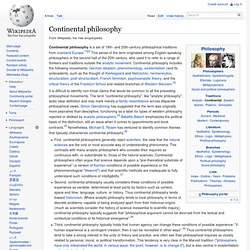
The term "continental philosophy", like "analytic philosophy", lacks clear definition and may mark merely a family resemblance across disparate philosophical views. Simon Glendinning has suggested that the term was originally more pejorative than descriptive, functioning as a label for types of western philosophy rejected or disliked by analytic philosophers.[4] Babette Babich emphasizes the political basis of the distinction, still an issue when it comes to appointments and book contracts.[5] Nonetheless, Michael E.
Rosen has ventured to identify common themes that typically characterize continental philosophy.[6] First, continental philosophers generally reject scientism, the view that the natural sciences are the only or most accurate way of understanding phenomena. Alain Badiou. Jacques Derrida. Jacques Derrida (/ʒɑːk ˈdɛrɨdə/; French: [ʒak dɛʁida]; born Jackie Élie Derrida;[1] July 15, 1930 – October 9, 2004) was a French philosopher, born in French Algeria.
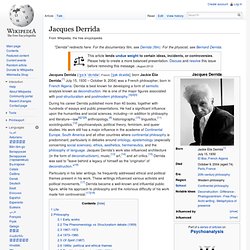
Derrida is best known for developing a form of semiotic analysis known as deconstruction. Post-structuralism. Post-structuralism is a label formulated by American academics to denote the heterogeneous works of a series of mid-20th-century French and continental philosophers and critical theorists who came to international prominence in the 1960s and '70s.[1][2][3] A major theme of post-structuralism is instability in the human sciences, due to the complexity of humans themselves and the impossibility of fully escaping structures in order that we might study them.
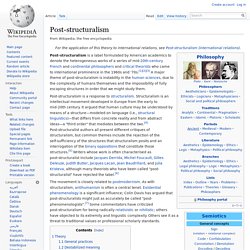
Post-structuralism is a response to structuralism. Structuralism is an intellectual movement developed in Europe from the early to mid-20th century. Postmodern philosophy. Postmodern philosophy is a philosophical direction which is critical of the foundational assumptions and universalizing tendency of Western philosophy. It emphasizes the importance of power relationships, personalization and discourse in the "construction" of truth and world views. Postmodern philosophy is often particularly skeptical about simple binary oppositions characteristic of structuralism, emphasizing the problem of the philosopher cleanly distinguishing knowledge from ignorance, social progress from reversion, dominance from submission, and presence from absence.[1][2] Postmodern philosophy has strong relations with the substantial literature of critical theory.[3] Definitional issues[edit] Philosopher John Deely has argued for the contentious claim that the label "postmodern" for thinkers such as Derrida et al. is premature.
On Exactitude in Science. "On Exactitude in Science" or "On Rigor in Science" (the original Spanish-language title is "Del rigor en la ciencia") is a one-paragraph short story by Jorge Luis Borges, about the map/territory relation, written in the form of a literary forgery.
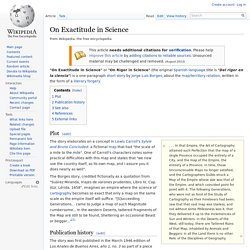
Plot[edit] . . . Jacques Lacan. Jacques Marie Émile Lacan (French: [ʒak lakɑ̃]; 13 April 1901 – 9 September 1981) was a French psychoanalyst and psychiatrist who has been called "the most controversial psycho-analyst since Freud".[1] Giving yearly seminars in Paris from 1953 to 1981, Lacan influenced many leading French intellectuals in the 1960s and the 1970s, especially those associated with poststructuralism.
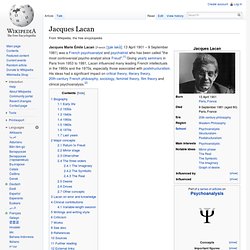
His ideas had a significant impact on critical theory, literary theory, 20th-century French philosophy, sociology, feminist theory, film theory and clinical psychoanalysis.[2] Biography[edit] Early life[edit] Lacan was born in Paris, the eldest of Emilie and Alfred Lacan's three children. His father was a successful soap and oils salesman. François Châtelet. François Châtelet (April 27, 1925 – December 26, 1985) was a historian of philosophy, political philosophy and professor in the socratic tradition.
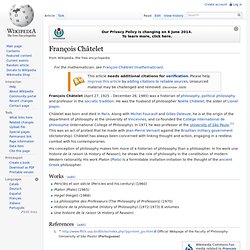
He was the husband of philosopher Noëlle Châtelet, the sister of Lionel Jospin. Châtelet was born and died in Paris. Along with Michel Foucault and Gilles Deleuze, he is at the origin of the department of philosophy at the University of Vincennes, and co-founded the Collège international de philosophie (International College of Philosophy). In 1971 he was professor at the University of São Paulo.[1] This was an act of protest that he made with Jean-Pierre Vernant against the Brazilian military government (dictatorship). Châtelet has always been concerned with linking thought and action, engaging in a restless combat with his contemporaries. Jean-François Lyotard. Biography[edit] Early life, educational background, and family[edit] Jean François Lyotard was born on August 10, 1924 in Versailles, France to Jean-Pierre Lyotard, a sales representative, and Madeleine Cavalli.
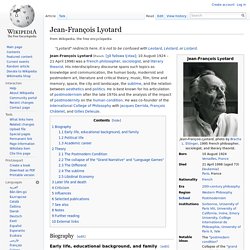
He went to primary school at the Paris lycée Buffon and Louis-le-Grand, and later studied philosophy at the Sorbonne in the late 1940's. Borges cartography. The Forms of Capital by Pierre Bourdieu 1986. Pierre Bourdieu 1986.
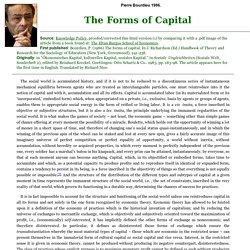
Source: Knowledge Policy, proofed/corrected this html version (1) by comparing it with a .pdf image of the article from a book found at: The Eltan Burgos School of Economics.First published: Bourdieu, P. (1986) The forms of capital. In J. Richardson (Ed.) Handbook of Theory and Research for the Sociology of Education (New York, Greenwood), 241-258.Originally: in “Ökonomisches Kapital, kulturelles Kapital, soziales Kapital.” in Soziale Ungleichheiten (Soziale Welt, Sonderheft 2), edited by Reinhard Kreckel. Goettingen: Otto Schartz & Co.. 1983. pp. 183-98. The social world is accumulated history, and if it is not to be reduced to a discontinuous series of instantaneous mechanical equilibria between agents who are treated as interchangeable particles, one must reintroduce into it the notion of capital and with it, accumulation and all its effects.
The Embodied State The Objectified State The Institutionalized State 1. 2. 3. 4. 5. 6. 7. 8. 9. 10. Deconstruction. Deconstructionism - By Movement / School - The Basics of Philosophy.